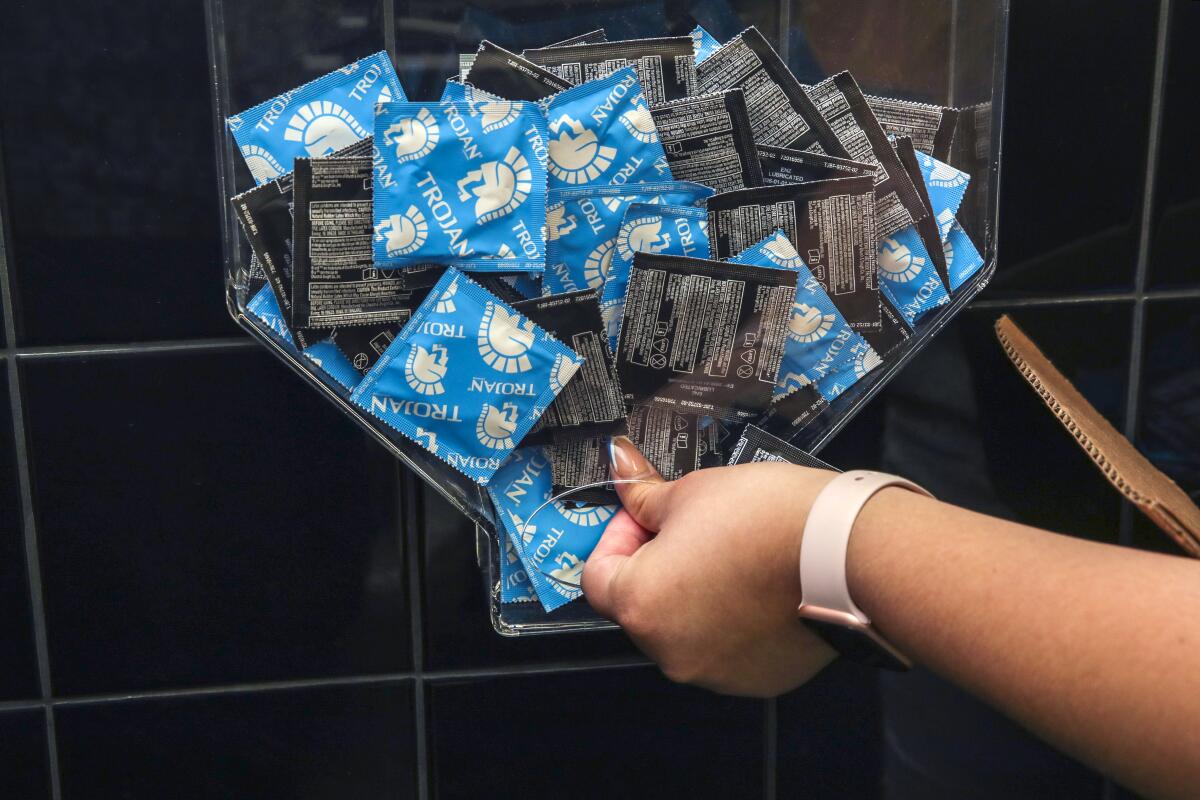California bill would require all public high schools to hand out free condoms

- Share via
A high school student went to a pharmacy to purchase condoms but was turned away because of his age.
A student wanting to buy condoms to prevent sexually transmitted diseases was shamed at the store.
For the record:
1:15 p.m. March 23, 2023An earlier version of this article, Ria Babaria’s last name was misspelled as Barbaria.
Another student couldn’t afford the contraceptives and became pregnant.
Teenagers shared these stories with Ria Babaria and Fiona Lu, California high school students who are co-policy directors for GENup, a youth-led social justice organization.
“Nobody was really talking about making condoms easily accessible,” Babaria said. “Youth are being discriminated against, they’re being harassed, they’re being shamed for getting contraceptives when it’s just a necessity for their health.”
To address this, state Sen. Caroline Menjivar (D-Panorama City) recently introduced legislation that would require public high schools in California to provide free condoms to students starting in the 2023-24 academic year. The bill also would cover the cost of human papillomavirus, or HPV, vaccinations for children under 18.
“We are addressing a demographic where we can be preventative, where we can step in at an impactful time so that once they’re adults we’re not scrambling to respond,” Menjivar said.
Senate Bill 541, co-sponsored by GENup, aims to reduce pregnancies and sexually transmitted infections, particularly in underserved rural areas. The schools would be required to post a prominent notice of available products on campus with additional contact information for these services.
Young people, and especially youth of color, have been disproportionately affected by high rates of sexually transmitted diseases in California, Menjivar said. Data show that people ages 15 to 24 account for more than half of these cases in the state. About 52% of sexually active young people use condoms, and testing rates for sexually transmitted diseases have declined among people ages 13 to 24, according to the Centers for Disease Control and Prevention.
Lu, who attends Northwood High School in Irvine, said her district does not provide free condoms. In her academically competitive school, sex is stigmatized and rarely talked about, she said.
“But obviously students do still have sex,” Lu said. “Not bringing any awareness to healthy sex habits leaves students with the idea that they don’t have anyone to talk to about this. They can’t get resources, or they feel ashamed to even ask about it or get it themselves at the store.”
This bill will also prohibit retailers from refusing to sell nonprescription contraception to minors.
In California, children 12 years and older can receive confidential reproductive health care, including prevention and treatment of pregnancy, HIV and sexually transmitted diseases. But teenagers still face barriers when trying to access these services.
“Sometimes condoms are behind the counter, and they [wrongly] ask for ID, or someone might say, ‘No, you’re too young.’ But that’s not going to stop teens from having sex,” Menjivar said. “That’s just going to prevent them from having safe sex.”
Condom availability programs in schools and sexual education became more common in the 1990s. The Santa Monica-Malibu Unified School District in 1992 was the first in Los Angeles County to hand out condoms to students on campus. The Long Beach and San Francisco school districts developed similar programs.
“By providing condoms, we’re not promoting anything other than self-advocacy and awareness,” said Erin De Tura, a school nurse in the Santa Monica-Malibu district. “When we create these networks of trust and communication, students may come to us with needs far greater than a condom.”
In 2019, L.A. County and Planned Parenthood opened 50 high school sexual health and well-being centers to bring care to teenagers in underserved communities. The clinics, funded through at least 2024, provide students with birth control pills and condoms, and tests and treatments for sexually transmitted diseases.
Greg Burt, director of California Family Council, a conservative Christian advocacy group, opposes SB 541 and said the state’s public schools have long taught students about condoms in sex education, but “it’s been a complete failure.”
“It should be obvious that more condoms are not the solution. The only sure way to reduce STI rates is to change student sexual activity and the number of sexual partners they have. We have to stop assuming hormonal teens can’t control themselves.”
Studies show that distributing condoms in schools does not increase sexual activity among teens but does increase contraceptive use. According to CDC data, about 20% of California high school students were sexually active in 2019, with 47% of them reporting that they did not use condoms the last time they had sex.
Condoms will be fully covered for women under Medi-Cal and most health insurances beginning in 2024 under legislation passed last year. But uninsured teens and males will not be spared the full cost, Menjivar said.
“This bill will close the gaps in areas that are more disproportionately impacted by health disparities, areas where the closest health clinic is 50 miles away,” she said. “We are making it easier by being a one-stop shop to get access to contraceptives at their school.”
SB 541 would also expand health services under Medi-Cal to cover immunization against HPV for children 18 and younger.
HPV vaccination rates fell nationwide during the COVID-19 pandemic, with 80% of teens having received only the first of three doses. According to the CDC, the virus causes more than 90% of anal and cervical cancers and about 70% of vaginal and vulvar cancers.
“Given the high rates of HPV cancer, I want to make sure everyone at any age is available to obtain that vaccine,” Menjivar said.
More to Read
Sign up for Essential California
The most important California stories and recommendations in your inbox every morning.
You may occasionally receive promotional content from the Los Angeles Times.











